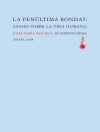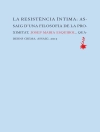This book celebrates the investigative power of phenomenology to explore the phenomenological sense of space and time in conjunction with the phenomenology of intentionality, the invisible, the sacred, and the mystical. It examines the course of life through its ontopoietic genesis, opening the cosmic sphere to logos. The work also explores, on the one hand, the intellectual drive to locate our cosmic position in the universe and, on the other, the pull toward the infinite. It intertwines science and its grounding principles with imagination in order to make sense of the infinite.
This work is the first of a two-part work that contains papers presented at the 62nd International Congress of Phenomenology, The Forces of the Cosmos and the Ontopoietic Genesis of Life, held in Paris, France, August 2012. It features the work of scholars in such diverse disciplines as biology, anthropology, pedagogy, and psychology who philosophically investigate the cosmic origins of beingness.
Coverage in this first part includes: Toward a New Enlightenment: Metaphysics as Philosophy of Life, Transformation in Phenomenology: Husserl and Tymieniecka, Biologically Organized Quantum Vacuum and the Cosmic Origin of Cellular Life, Plotinus ‘Enneads’ and Self-Creation, The Creative Potential of Humor, Transcendental Morphology – A Phenomenological Interpretation of Human and Non-Human Cosmos, and Cognition and Emotion: From Dichotomy to Ambiguity.
Daftar Isi
PART I.- Chapter 1: Toward a New Enlightenment: Metaphysics as Philosophy of Life; Nicoletta Ghigi (translated by Antonio Calcagno).- Chapter 2: Moral Excellence as Cosmicization of Human Beingness in the Ontopoietic Perspective; Carmen Cozma.- Chapter 3: The Inseparable Link between ‘Cosmology’ and ‘Life World’ in Anna-Teresa Tymieniecka’s Philosophy: The Originality of a New Perspective of the ‘Real Individual and Autonomous Being’, A Possible Comparison with Hedwig Conrad-Martius’ ‘Phenomenological Realism’; Francesco Alfieri.- Chapter 4: The Forces of the Cosmos before Genesis and Before Life. Some Remarks on Eugen Fink’s Philosophy of the World; Simona Bertolini.- PART II.- Chapter 5: Ontopoiesis in Ben Okri’s Poetic Oeuvre and A Time for New Dreams (2011); Rosemary Gray.- Chapter 6: Cosmic Order and Exoneration of the Beautiful: Visions of the Problem in Contemporary Philosophy; Ella Buceniece.- Chapter 7: The Law of Opposites in the Ontopoiesis of Life and in Language; Zaiga Ikere.- Chapter 8: The Forces of Darkness and the Forces of Goodness: Jerzy Nowosielski’s Concept; Katarzyna Stark.- Chapter 9: Transformation in Phenomenology: Husserl and Tymieniecka; Anar Jafarov.- PART III.- Chapter 10: Anthropological Regression in the Modern World vs. Anna-Teresa Tymieniecka’s Metaphysics of Ontopoiesis of Life; Jan Szmyd.- Chapter 11: Biologically Organized Quantum Vacuum and the Cosmic Origin of Cellular Life; Attila Grandpierre.- Chapter 12: The Cosmos of Yolanthe – Knowing Without Seeing; Detlev Quintern.- Chapter 13: Philosophical Hermeneutics Confronted by that which is Different; Aleksandra Pawliszyn.- Chapter 14: Anna-Teresa Tymieniecka’s and Max Scheler’s Phenomenology as the Ontopoietic Genesis of a Manager’s Life; Bronislaw Bombala.- PART IV.- Chapter 15: Comparative Phenomenology of Singing and Dance as Involving Artistic ‘Instruments’ Incorporated into the Body of their Performer; Alessia Rita Vitale.- Chapter 16: Phenomenology and Archeology: Methodological Insights and Thematic Inspirations; Jaroslava Vydrova.- Chapter 17: Plotinus ‘Enneads’ and Self-Creation; Ineta Kivle.- Chapter 18: Directing Anatoly Vasilyev, from Individual Creative Manner to the Method; Valery Kolenova.- PART V.- Chapter 19: Teleology in Nature and Life-Transforming Art; Vladimir L. Marchenkov.- Chapter 20: The Creative Potential of Humor; Anna Malecka.- Chapter 21: Educational Paradigm Shift Towards Phenomenological Pedagogy; Kiymet Selvi.- Chapter 22: Human Soul, Body and Life Horizons; Maija Kule.- PART VI.- Chapter 23: The Unity of Eastern and Western Thought Traditions in A-T. Tymieniecka’s Phenomenology of Life; Salahaddin Khalilov.- Chapter 24: Transcendental Morphology – A Phenomenological Interpretation of Human and Non-Human Cosmos; Bence Peter Marosan.- Chapter 25: The Outside’s Inside: The Phenomenology of the External World in Hedwig Conrad-Martius’ Thought; Ronny Miron.- Chapter 26: Kant and Starry Heavens or the Splendor and Misery of Speculative Rationalism; Rihards Kulis.- PART VII.- Chapter 27: How to Approach Heideggerian Gods; Jani Vanhala.- Chapter 28 : Meaning in the Forthcoming Sciences of Life: From Nietzsche and Husserl to Embodiment and Biosemiotics; Ammar Zeifa.- Chapter 29: Motion in Crisis: Why the Analytic Principles of Thought Destroy Motion and Life in the Cosmos; Ion Soteropoulous.- Chapter 30: “Heraclitus/Nietzsche/Heidegger in Πόλεμς” – “τὰ δὲ Πάντα οἰακίζει Κεραυνός”- Heraclitus; Kiyimo Murata-Soraci.- Chapter 31: Lebenswelt and Operational Methodology in the Philosophical and the Epistemological Reflections of Hugo Dingler; Dario Sacchi.- Chapter 32: The Permanent Creativity of the Self; Stefano Polenta.- PART VIII.- Chapter 33: Cognition and Emotion: From Dichotomy to Ambiguity; Claus Halberg and Simen Oyen.- Chapter 34 : The Meeting of Man with Man; Leszek Pyra.- Chapter 35: Humour, an Enlightening and Restorative Force of the Inner Cosmos: A Phenomenological Approach; Tereza-Brindusa Palade.
Tentang Penulis
Anna-Teresa Tymieniecka (born February 28, 1923) is a Polish-born American philosopher, one of the most important and continuously active contemporary phenomenologists, founder and president of The World Phenomenology Institute, and editor (since its inception in the late 1960s) of the book series Analecta Husserliana, presently published by Springer.












